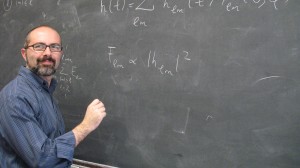OXFORD, Miss. – A University of Mississippi physicist, well-known for his work on general relativity and black holes, has been elected as a fellow of the American Physical Society.
Emanuele Berti, UM associate professor of physics and astronomy, was awarded the prestigious honor during the society’s annual fall meeting in September. The citation acknowledges Berti “for important contributions to theoretical gravitational-wave physics, including quasi-normal modes of black holes, tests of alternative theories, the links between analytic and numerical relativity, and the astrophysics of merging black holes.”
“Previous fellows in gravitational physics are colleagues that I greatly respect and admire, and I will work even harder from now on to show that I deserve to join their ranks,” Berti said. “I hope that this award will give more visibility to the good research carried out in all fields by our department, and help to boost the recent growth of our university as a research-oriented institution.”
Lucien Cremaldi, UM chair and professor of physics and astronomy, praised his colleague’s induction.
“This is a very prestigious award, as election to fellow in the American Physical Society is limited to no more than one-half of 1 percent of the membership,” Cremaldi said. “Dr. Berti has been recognized by his peers for his outstanding contributions to physics.”
Berti has published more than 100 articles, 10 of which in Physical Review Letters, the most prestigious publication produced by the American Physical Society and American Institute of Physics.
One focus of his research is pairs of black holes that spiral into each other and merge, producing gravitational waves. Experimentalists are hoping to detect the waves from such mergers soon, so it is important to model the process accurately. Berti’s most recent paper in Physical Review Letters was selected as an Editors’ Suggestion. In the paper, Berti and his collaborators discovered that if the black holes are spinning in opposite directions, they can suddenly start precessing like a wobbly top.
Berti earned his doctorate at the University of Rome in Italy. He later worked in Greece, France and the U.S. before joining the UM faculty. He is also a visiting associate professor at the California Institute of Technology, an FCT Investigator in Lisbon (Portugal) and the recipient of a highly competitive CAREER Award from the National Science Foundation.
His research interests include theoretical astrophysics and relativity, black holes, neutron stars, gravitational wave emission and detection, and experimental tests of Einstein’s general relativity theory.
Keep up with the Gravitation, Astrophysics, and Theoretical Physics group at UM and with Berti’s research by visiting http://www.phy.olemiss.edu/GR/ and http://www.phy.olemiss.edu/~berti/.
